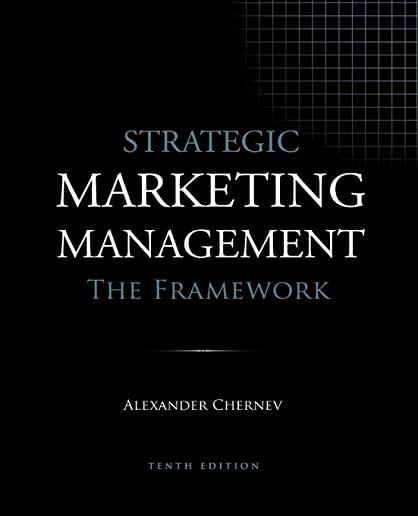
Strategic Marketing Management: The Framework delineates the fundamentals of marketing strategy, offers a systematic approach to marketing management, and presents a value-based framework for developing viable market offerings. The theory presented stems from the view of marketing as a value-creation process that is central to any business enterprise. In addition to theory, this book offers a set of practical tools that enable managers to apply the knowledge contained in the generalized frameworks to specific business problems and market opportunities.
The information contained in this volume is organized into five major parts. The first part defines the essence of marketing as a business discipline and outlines an overarching framework for marketing management that serves as the organizing principle for the information presented in the rest of the book. We discuss the role of marketing management as a value-creation process, the essentials of marketing strategy and tactics as the key components of a company's business model, and the process of developing an actionable marketing plan.
Part Two covers issues pertaining to the development of a marketing strategy that will guide the company's tactical activities. Here we focus on three fundamental aspects of a company's marketing strategy: the identification of target customers, the development of a customer value proposition, and the development of a value proposition for the company and its collaborators.
Part Three focuses on the marketing tactics, viewed as a process of designing, communicating, and delivering value. We discuss how companies design their offerings and, specifically, how they develop key aspects of their products, services, brands, prices, and incentives. We further address the ways in which companies manage their marketing communication and explore the role of distribution channels in delivering the company's offerings to target customers.
The fourth part of the book focuses on managing growth. We discuss strategies used by companies to gain and defend market position and, in this context, address the issues of pioneering advantage and managing sales growth. We further address the process of developing new market offerings and the ways in which companies manage product lines to create market value. We also discuss the key principles of managing product lines and ways in which companies can use product lines to gain and defend market position.
The final part of this book provides a set of tools that illustrate the practical application of marketing theory. This part presents two workbooks: a workbook for segmenting the market and identifying target customers and a workbook for developing the strategic and tactical components of a company's business model.
The marketing framework outlined in this book applies to a wide range of companies--startups and established enterprises, consumer packaged goods companies and business-to-business enterprises, high-tech and low-tech ventures, online and brick-and-mortar entities, product manufacturers and value-added service providers, nonprofit organizations and profit-driven companies. This book combines theoretical rigor with practical relevance to strengthen the marketing skills of a wide array of business professionals--from those creating novel market offerings to those improving on existing ones, from entrepreneurs launching a new business to managers working in established corporations, and from product managers to senior executives.
Strategic Marketing Management: The Framework is an abbreviated version of a more comprehensive volume, Strategic Marketing Management: Theory and Practice, which is intended for readers seeking broader and more in-depth discussion, detailed analysis, and additional perspectives on the topics presented in the current book.
member goods
listens & views

NICOLE & THE TRIAL OF ...
by NEWMAN,ANTHONY AND MARY JANE / MUSICA ANTIQUE NY
COMPACT DISCout of stock
$14.75






